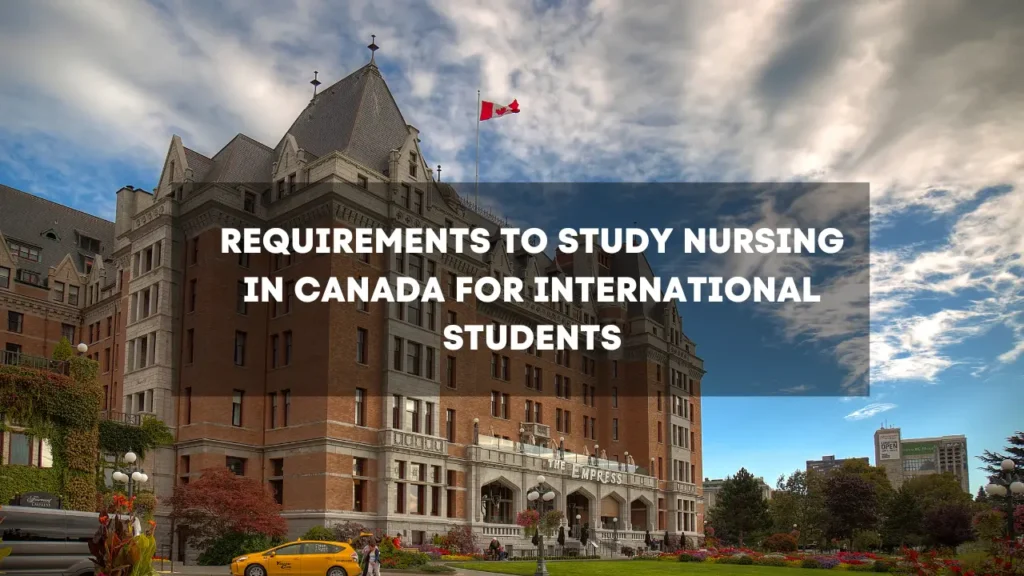Canada is among the most popular destinations for international students who want to pursue the field of health care, specifically nursing. With top-quality education and hands-on training in clinical practice and worldwide recognition, Canadian nursing programs are ideal for students who aspire to a career as licensed nurses (RNs) or nurse practitioners (PNs) or other specialised professionals working in the field of healthcare.
Before you start packing your bags, it is essential to be aware of the specific Requirements to Study Nursing in Canada for International Students. From eligibility and language tests to the documents required for visas and other steps, this guide will cover everything international students require to get started on their nursing education in Canada.
Table of Contents
What are the Requirements to Study Nursing in Canada for International Students?
To pursue a nursing degree at a nursing school in Canada for international study, students will need:
- A high school diploma or an undergraduate degree (depending on the level of the program)
- English language proficiency (IELTS/TOEFL)
- Acceptance by a Designated Learning Institution (DLI)
- A valid study permit
- A financial proof of your stay
Let’s examine these requirements in greater detail in the following paragraphs.
READ MORE:- Canada Visitor Visa Processing Time
Academic Requirements
The minimum academic requirements are based of the specific program.
| Program Type | Eligibility Criteria |
|---|---|
| Diploma in Nursing | Secondary school (Grade 12) with Chemistry and Biology |
| Bachelor’s in Nursing | A nursing degree or diploma is awarded from your country of origin |
| Postgraduate Certificate | A nursing degree or diploma is awarded from the your country of origin |
| Master of Nursing (MN) | Bachelor’s degree in Nursing, 1-2 years of experience |
Notice: Most universities require at the very least 70%-75% overall for the earlier academic programs.
English Language Proficiency
Because Canada is an English-speaking nation that means non-natives must demonstrate their language proficiency.
Tests and results that are accepted:
- IELTS Academic Minimum Overall 6.5 (no band lower than 6.0)
- TOEFL ibt: 88+
- PTE Academic: 60+
- Duolingo (only accepted by a few institutions) 110+
Read More:- Canada Study Visa Requirements
Documents Required
Here’s a list of the documents needed to apply to nursing programs:
- Academic transcripts and certifications
- Valid passport
- A proof that you have English ability (IELTS/TOEFL score)
- CV/Resume (for the PG as well as MN programs)
- Statement of Purpose (SOP)
- Letters of Recommendation (LORs)
- A Letter of Acceptance issued by DLI
- Photos of passport size
- Evidence of the funds needed to cover tuition and living expenses.
- Study Visa or study permit
Nursing Programs Available in Canada
There are many options for international students based on their academic background.
| Program Type | Duration | Best For |
|---|---|---|
| Practical Nursing Diploma | Three to four years | Specialisation or upgrade of skills |
| BSc in Nursing | 4 years old | Becoming a Registered Nurse (RN) |
| Post-Graduate Certificates | 1-year-olds | Specialization or upgrade of skills |
| Master of Nursing (MN) | 2 years | Leadership or advanced practice roles |
Top Colleges and Universities for Nursing
If you’re looking for top-quality training and licensure, go with an institution that is well-known. Here are some of the best nursing schools:
- University of Toronto – Top-ranked in Canada
- University of British Columbia (UBC) – Known for its research in global healthcare
- McMaster University – Offers an accelerated BScN program
- University of Alberta offers BScN, MScN and PhD programs.
- Centennial College – Practical nursing and diploma programs
READ MORE:- Study Permit Extension Processing Time In Canada
Cost of Studying Nursing in Canada
Understanding costs will assist you in planning financially.
| Expense Category | Estimated Cost (CAD/year) |
|---|---|
| Tuition Fees | $15,000 – $30,000 |
| Living Expenses | $10,000 – $15,000 |
| Health Insurance | $600 – $1,000 |
| Books & Supplies | $500 – $1,000 |
| Total (Approximate) | $26,000 – $47,000 |
You will also need to provide proof of having funds of at minimum $10,000 CAD per year in addition to tuition when you apply for the study permit.
How to Apply to a Nursing Program in Canada
This is a quick step-by-step instruction:
- Research schools and programs that accept students from abroad.
- Check for eligibility and documents required.
- Online applications are accepted through the portal for colleges and universities or central online application systems (e.g., OUAC in Ontario).
- Upload all required documentation in order to pay for the application fees.
- Watch for the acceptance letter.
- Request a student permit.
- Visa to Canada with approval.
Study Permit Requirements
To pursue a degree in Canada, International students have to apply for a visa to study.
You’ll require:
- The Letter of Acceptance received from DLI
- Valid passport
- The proof of funds required to pay for tuition and $10,000 CAD per year
- Photos of passport-sized size
- Medical exam (if necessary)
- Police clearance (if required)
- Biometrics (fingerprints and photos)
- Evidence of intent to leave Canada following the completion of studies
Can students from other countries study nursing?
Yes. You can:
- Work up to 20 hours per week during the semester.
- Work full-time during official breaks
- Learn practical knowledge through co-ops or internships (if you are able to include them in your curriculum)
- Apply for a post-graduation work Permit (PGWP) after you have completed your course
Can nursing be a job option in Canada?
absolutely. Canada is facing a nursing shortage, which means there is an abundance of demand and great job prospects. If you have a degree in nursing from Canada, you can apply for:
- Post-Graduation Work Permit (PGWP)
- Permanent Residency (PR) via Express Entry or Provincial Nominee Program (PNP)
- Specific roles like Nurse Practitioner, Nursing Assistant, Critical Care and many more
Final Thoughts
Studying nursing in Canada is a smart investment in your future. With excellent education, career opportunities, and a clear pathway to permanent residency, international students have a lot to gain. Make sure you meet all academic, language, and visa requirements before applying, and start preparing early.
FAQ’s
Can I study nursing in Canada without IELTS?
Most institutions require IELTS or another English test, but a few may waive it if you studied in an English-speaking country or submit other proof. However, for visa purposes, IELTS is highly recommended.
How much percentage is required to study nursing in Canada?
You typically need a minimum of 65%–75 % in your high school or previous degree, especially in science subjects like Biology, Chemistry, and English.
How long does it take to become a registered nurse in Canada?
If you take a Bachelor’s in Nursing, it typically takes 4 years. Practical nursing programs may take 2–3 years.
Is there an age limit to study nursing in Canada?
No. There’s no strict age limit. However, most applicants are between 18–35 years old, and mature students may need to provide additional documents or prove academic readiness.
Can I get PR after studying nursing in Canada?
Yes. Nursing is in high demand. After gaining Canadian work experience through PGWP, you can apply for Permanent Residency via Express Entry or a Provincial Nominee Program (PNP).


